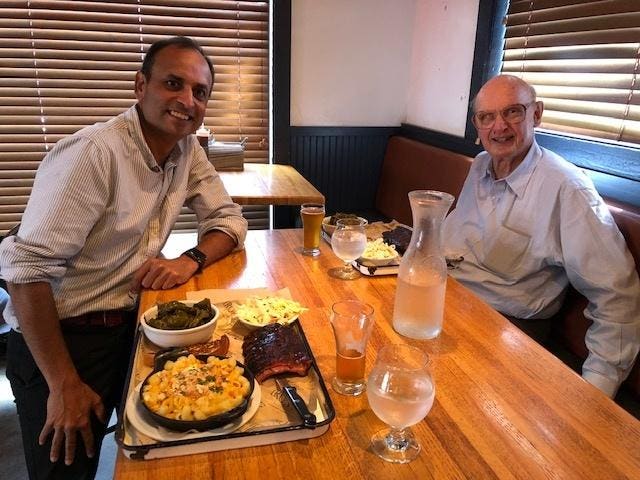The financial community was saddened to hear of the passing of Harry Markowitz on June 22. Not only was Harry a pioneer in many fields and a Nobel laureate, he was also just an amazing, friendly and open person. Since he was an advisor to my firm for a couple of years, we got to spend a lot of time discussing research topics, frequently while walking to and back from his neighborhood barbeque joint where I learnt his mantra that “there is a big difference between knowing about something and knowing something”. Harry always knew stuff deeply. Harry also liked to get a good deal, whether it was at the all-you-could-eat diner, or later in his life, making astute real-estate investments in the trough of the housing market melt-down.
At one conference I was giving a talk on the topic of distinguishing between real and imaginary (impossible) probability distributions, which is fundamental to making inferences and good investments. When shown two AI generated images, of amongst the 100 or so participants in the room, only Harry raised his hand and identified the correct one. Undoubtedly there were others who probably thought or knew the right answer, but Harry was the only one who both knew the difference and fearlessly ventured to raise his hand. No wonder he was the one who had stepped up, almost seventy years ago, to present modern portfolio theory (MPT) in the form that it is more or less still used today, before risk was just a hodge-podge of confused concepts. Mean-Variance optimization, even with its flaws, is still the bedrock of portfolio construction. And by the way, the millions of words of ink that have been spilled critiquing MPT were actually explicitly anticipated and discussed by Harry himself seven decades ago (please download and read his original papers to see this for yourself).
At the end of my talk I asked how he knew the difference between the two probability distributions; he said he had always seen things differently. He used this metaphor jokingly sometimes, since he was blinded in one eye due to an accident in college, and would ask me to walk on one side of him and not the other lest he run over his walking companion! He also drove the same version of a Jeep Cherokee since it had better visibility on the right side.
In early 2007 I heard Harry give a talk on how leverage constraints and the need for yield could result in investors making sub-optimal investment decisions. I followed this with a short note describing his brilliant insight and what that could mean for leveraged synthetic credit such as CDOs (it was titled “Markowitz Bites Back: The Failure of CAPM, Compression of Risky Asset Spreads and Paths Back to Normalcy”). Long story short, Markowitz’s brilliant insight was right on the money and anticipated the financial crisis of 2008 as many of these sub-optimal yield harvesting strategies blew up. All because many investors had learned about portfolio risk, but not really learned that when you mix portfolio optimization with constraints and lever the mixture it becomes toxic and explosive.
For those who were fortunate enough to visit him in his office in La Jolla, Harry would love to share his book collection, which was sorted in a very logical fashion and arranged in neat bookshelves under a “Life Is Good” sign, and which consisted of many first edition monographs, mostly on topics in mathematics and physics. Harry also had a tiering system for his books, so the important ones were easy to see and access. Mine happened to end up on the top shelf because of the alphabet, but I don’t know if he ever opened them.
Given his tenure and influence on the financial industry, operations research and so many other fields, it will take years of conferences and papers to thoroughly interpret and admire his groundbreaking contributions. I, like others in the industry, look forward to participating in many of these as we continue to digest his research and insights, and thank my good luck for having had some one-on-one time with him.
For people not in the industry, they can rest assured that investing became safer because of the creative innovations of Harry Markowitz, not only because of how he thought differently himself, but how he could make you think differently, and correctly, after you got to spend just a few minutes with him.
Read the full article here





